Dan Burros was the third highest ranking member of the American Nazi Party. He was also a Jew.
Even his fellow Nazis were embarrassed by the intensity of his Anti-Semitism. He liked to draw pictures of dead or dying Jews. He carried around a bar of soap with a German label that read: "made from the finest Jewish fat." He was fascinated by gas chambers, and hoped to one day be in charge of one.
When the New York Times revealed his Jewish heritage, he shot himself in the head.
The main character in Henry Bean's film, The Believer, is based on this Ashkenazi Nazi. In one scene, Danny—the character based on Burros—meets with the reporter who would later expose him. Danny delivers an antisemitic screed, claiming, “The Jew doesn't have soil,” to which the reporter retorts, “He has Israel.” Danny responds:
Those aren’t Jews... the real Jew is a wanderer, a nomad. He has no roots, no attachments. So he universalizes everything. He can't hammer a nail, plow a field. He can only buy and sell, invest capital, manipulate markets. He takes the life of a people rooted in soil and turns it into a cosmopolitan culture based on books, ideas, numbers.
For Danny, Jewishness is homelessness. When the Jew gains a homeland, he ceases to be a Jew. In Israel, the wandering merchant becomes a farmer. The intellectual becomes a soldier. The rootless cosmopolitan becomes a rooted peasant. The Jew becomes a gentile.
This might sound like the deranged ramblings of a self-hating Jew, but strikingly similar ideas were expressed by the founding fathers of Zionism. Like Danny, they believed that Jews had been corrupted by their homelessness. They thought that only a return to the land could redeem them from their moral and physical “degeneracy." The children of Israel would not be peddlers, merchants, or lawyers. They would be armed farmers and Hebrew Commanders.
Zionism is anti-Semitic, in that it is fundamentally at odds with Jewish identity. For almost two thousand years, Jewishness was defined by homelessness. But with the creation of Israel, Jews rejected their homelessness, and embraced nationalism. Jewish nationalists wanted to forge a “new Jew” that would be the antithesis of the old one. This essay is about that “new Jew”, whom I will refer to as the Ashkenazi Nazi.
The Mercurial Jew
In his book, The Jewish Century, Yuri Slezkine associates Jews with the Greek God Hermes. Hermes’ name derives from the Greek word for “stone heap”. In antiquity, stone heaps—called "herma"—served as guideposts and boundary markers along roads.
Hermes is the God of roads, travelers, merchants, thieves, and border crossers. He guides people on journeys between countries and continents. He travels between the earth, Olympus, and the underworld. He is the herald of the Gods, delivering messages to mortals and the dead alike.
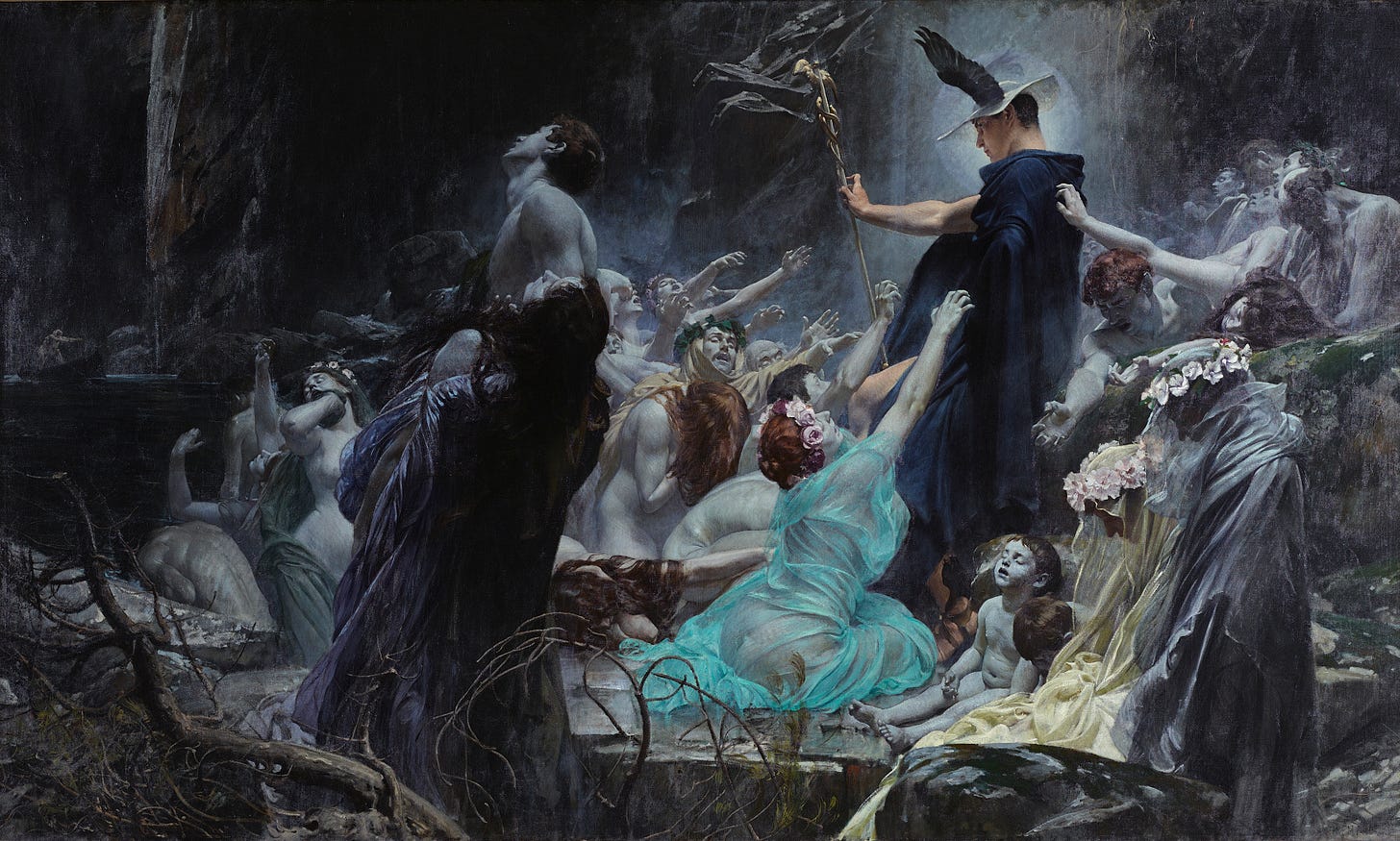
Hermes is physically weak, but he is clever. This trickster god lived by a quality that the Greeks called metis, or “cunning intelligence”. Cunning intelligence is the most potent weapon of the weak. It enables them to outflank stronger opponents. As a baby, Hermes used his cunning intelligence to steal cattle from big strong Apollo. He drove the cattle backwards so their hoofprints led in the wrong direction, and crafted sandals from bark to disguise his own footsteps. In other words, he used subterfuge and deceit to steal from the God of order and virtue.
Cunning intelligence is the most ambiguous of virtues. It is often more effective than brute strength, but is typically regarded as dishonorable, particularly by the aristocratic warrior types. To them, Hermes lacks honour and dignified manliness.
The Roman equivalent of Hermes was Mercury. The name Mercury is derived from the Latin word "merx," meaning "merchandise." Mercury was the patron God of merchants, traders, and commercial intermediaries.
Mercurians are non-primary producers specializing in the delivery of goods and services. They do not herd animals, till the soil, or live by the sword. Instead, they connect producers to consumers, facilitate transactions across borders, and exploit information asymmetries.
To facilitate trade across borders, one must speak multiple languages. Mercury was the God of eloquence, and Mercurians are multilingual. They use this eloquence and multilinguality to negotiate, translate, and mediate across borders. Mercurians are experts in foreign affairs; in addition to being merchants, they are diplomats, translators, and intel agents.
As the God of eloquence, Mercury became the patron of writers. Horace called writers "Mercuriales viri", or Mercury's men. Mercurians cross boundaries with merchandise and messages. They make their living not only through the exchange of goods, but through the exchange of ideas. They work as journalists, scholars, and intellectuals. Many newspapers still bear Mercury in their title, honoring the ancient messenger God.
At this point, you probably think that I'm using the word Mercurian as a euphemism for Jew. But I'm not. Jews are not the only mercurial people. The Chinese in Southeast Asia, Parsis in India, Lebanese in West Africa, and the Ibos in Nigeria are all examples of mercurial people.
Chinese immigrants typically arrived in Southeast Asia in a state of poverty. According to Victor Purcell’s book, The Chinese in Southeast Asia, “immigrant Chinese arriving in South-East Asia usually brought nothing but a bundle of clothes, a mat, and a pillow.” They began making a living by peddling goods, but eventually moved into retail, garment making, and banking. By the late Twentieth century, they had achieved almost total control of the Southeast Asian economy. This pattern was particularly striking in the Philippines, where Chinese immigrants controlled 60% of the private economy, despite comprising only 2% of the population. They owned virtually all the banks, hotels, shopping malls, and major conglomerates. They also controlled six of the ten English-language newspapers in the Philippines, including the one with the largest circulation. Similar patterns of Chinese economic and media dominance emerged in Malaysia, Thailand, Vietnam, and Burma.
This dominance was resented by the natives of Southeast Asia. The overseas Chinese have frequently been subjected to mob violence. When the Rupiah crashed in 1998, the Chinese—who controlled most of Indonesia’s banks despite making up only 3% of its population—were blamed. Screaming Muslim mobs torched, smashed, and looted hundreds of Chinese shops and homes in Jakarta, leaving over two thousand dead. One survivor, a fourteen-year-old Chinese girl, later committed suicide by taking rat poison. She had been gang-raped and genitally mutilated in front of her parents.
Many ethnic Chinese fled to Singapore and Australia after these riots. Those who remained in Indonesia purchased "anti-rape corsets"—stainless steel chastity belts, complete with tiny keys, developed by a Chinese entrepreneur.
The Indonesians treated the Chinese much like the Germans treated the Jews, or the Ottomans treated the Armenians, or the Sierra Leoneans treated the Lebanese. Which is to say, they treated them with suspicion, hostility, and ultimately genocidal violence. Ethnic majorities typically view Mercurian minorities as devious, greedy, and dangerous. Anti-Mercurian rhetoric consistently employs the language of contagion and infestation. The Chinese, Jews, Armenians, and Lebanese have all been described as “parasites,” “bloodsuckers,” or “leeches”.
Mercurians do not produce any physical products, nor do they work with their hands. Instead, they provide goods and services. This is often resented by the ethnic majority, who feel like they don’t do any “real” work. To quote Thomas Sowell:
For much of human history, most people did arduous work in agriculture, and the rise of industrial societies meant for most of them simply the transfer of the scene of that arduous labor from the farm to the factory. In that setting, people who made a living more easily, and with clean hands, just by selling what others had produced, and who received back more money than they had lent, were readily resented. Add in the factor of ethnic differences in the case of middleman minorities, and there are the ingredients for resentments to arise spontaneously and for demagogues to be able to raise those resentments to a higher pitch.
Ottoman politician Mehmed Reşid said that Armenians were “bandits and microbes to be eliminated”, and 1.5 million of them were eliminated during WW1. Ugandan dictator Idi Amin said that Indians had “no interest in Uganda beyond the aim of making as much profit as possible”, and expelled 70,000 of them without their assets. In post-independence Kenya, Indians—who controlled 80 percent of all manufacturing firms—were called "bloodsuckers" and "leeches". In 1982, they were pogromed.
It might be tempting to describe these as acts of “racism”, though that isn't quite right. I think they are better described as acts of “anti-Mercurial hate.” Anti-Mercurial hate is animosity toward people who are simultaneously part of and apart from the dominant society, occupying middlemen roles.
I think that anti-Semitism isn’t an altogether unique phenomenon. It is just another form of anti-mercurial hate. That said, it is the most intense form of this hatred, because Jews are the most mercurial Mercurians. They have lived as wanderers for nearly two millennia, and are the service nomads par excellence. When people want to describe a successful middleman minority, they instinctively reach for Jewish comparisons: the overseas Chinese are called “the Jews of Southeast Asia,” the Ibos are called “the Jews of Nigeria,” the Parsees are called “the Jews of India,” and the Lebanese are called “the Jews of West Africa.”
As the most successful Mercurians, the Jews have also been the most hated. The Holocaust represents the most lethal manifestation of this hatred in human history.
Interestingly, many early Zionists shared this anti-mercurial hatred. They believed that centuries of rootlessness had degraded the Jewish people both morally and physically. Only by returning to the land and doing honest work could they be redeemed.
Yiddish Blood & Soil
In 1948, David Ben-Gurion proclaimed the establishment of Israel. Above him hung a portrait of Theodor Herzl, the only Jewish leader mentioned by name in Israel's Declaration of Independence. More than anyone else, Herzl is the father of the Jewish state. He is often described as the George Washington of Israel, and is widely referred to as "hozeh ha-medinah," or, the visionary of the state.
.Herzl was born in Budapest to Jewish parents. When he turned eighteen, he moved to Austria. At the University of Vienna, he tried to distance himself from his Jewish-Hungarian origins. He joined a German nationalist fraternity called Albia. In order to be admitted, he had to engage in a duel that would only end when blood was drawn. Herzl immersed himself in fencing lessons to prepare for this duel. On May 11th, 1881, both he and his opponent drew blood, and Herzl was welcomed into the fraternity.
At Albia, Herzl cosplayed as a crusader. He nicknamed himself Tancred after the Norman warrior who conquered Palestine in the 11th century.
He also developed an intense admiration for the Prussian nobility, which he associated with virility, discipline, and manliness. In his diary, he wrote, “if there is one thing I should like to be, it is a member of the old Prussian nobility.” The Prussian farmer and warrior, Otto von Bismarck, was his personal hero. To quote one of Herzl’s biographers, Derek Pensla:
Underneath Herzl’s idolization of warriors like Bismarck and Tancred was a devotion to, even an obsession with, personal honor. Striving to be a man of honor, Herzl did not mind the anti-Jewish barbs that saturated Albia’s beery, German chauvinist air as long as he was accorded respect and the chance to prove his worth.
Herzl didn’t mind the anti-Jewish barbs. Indeed, he shared Albia's disdain for stereotypical ghetto Jews, whom he called “Yids”. Yid was an epithet used to describe Eastern Jews who spoke Yiddish. They had grown up in the shtetls of Eastern Europe, totally alienated from European culture.
In the late 19th century, there was a wave of pogroms across Eastern Europe. In order to avoid persecution, Yids began moving West. For Herzl, these “wandering Jews… either introduced Anti-Semitism where it did not exist, or intensified it where it did.”
As an assimilated Western Jew, Herzl had contempt for Eastern Jews. He thought that they were vulgar, materialistic, and provincial. When speaking about them, he wrote:
Just merely to look at him, let alone approach or, heaven forbid, touch him was enough to make us feel sick. But our disgust, until now, was moderated by pity; we sought extenuating, historical explanations for his being so crooked, sleazy, and shabby a specimen. Moreover, we told ourselves that he was, after all, our fellow tribesman, though we had no cause to be proud of his fellowship . . . . who is this Yid, anyway? A type, my dear friends, a figure that pops up time and again, the dreadful companion of the Jew, and so inseparable from him that they have always been mistaken for one for the other. The Jew is a human being like any other, no better and no worse … The Yid, on the other hand, is a hideous distortion of the human character, something unspeakably low and repulsive.
Herzl believed that the "Yid" fueled antisemitism by confirming people’s stereotypes about Jews. As an assimilated German Jew, he desperately tried to distance himself from them, even going so far as to suggest that they were a different race. In his article, Mauschel, he wrote “at some dark moment in our history some inferior human material got into our unfortunate people and blended with it.” This blend resulted in the Yid.
Herzl was LARPing as a Prussian noble. He loved Wagner, duelling, and German culture. He feared that this vulgar "Yid" would make his assimilation into this culture impossible. No matter how un-Jewish or un-Yiddish he became, Germans would always associate him with Eastern Jews. The only way to remove the stigma of this association was to remove the Yid from Europe. A Jewish state would quarantine Eastern Jews from their Western brethren, and anti-semitism would disappear with the disappearance of that which provoked it (i.e., the Yid). In other words, Zionism would eliminate the last barrier to Jewish assimilation. To quote Herzl:
In our own day, even a flight from religion can no longer rid the Jew of the Yid. Race is now the issue - as if the Jew and the Yid belonged to the same race. But go and prove that to the anti-Semite. To him, the two are always and inextricably linked….And then came Zionism!….We'll breathe more easily, having got rid once and for all of these people whom, with furtive shame, we were obliged to treat as our fellow tribesmen….Watch out, Yid. Zionism might proceed like Wilhelm Tell…and keep a second arrow in reserve. Should the first shot miss, the second will serve the cause of vengeance. Friends, Zionism's second arrow will pierce the Yid's chest.
Despite his harsh language, Herzl still had sympathy for the Yid. He wanted to elevate and redeem him, rather than just remove him. He believed that the conquest and colonisation of Palestine would transform this "crooked, sleazy, and shabby specimen" into something new and improved. It would create a “new Jew” that was distinct from the old one. This new Zionist man would hike, exercise, plow fields, hammer nails, and serve in the military. He would abandon the mercurial ways of his parents, and return to the agrarian and warrior traditions of his biblical ancestors.
Herzl's desire to create a “new Jew” was shared by nearly all early Zionists, from leftists like Ben-Gurion and Moses Hess to rightists like Max Nordau and Ze'ev Jabotinsky. Each of these men shared Herzl’s desire to reshape the Jewish man.
Ben-Gurion, Israel's first prime minister, declared that diaspora Jews "have no roots. They are rootless cosmopolitans — there can be nothing worse than that.” Moses Hess, the founder of the Labour Zionist movement, wrote:
A common, native soil is a primary condition, if there is to be introduced among the Jews better relations between Capital and Labor. The social man, just as the social plant and animal, needs for his growth and development a wide, free soil; without it, he sinks to the status of a parasite, which feeds at the expense of others.
Max Nordau, the co-founder of the World Zionist Organization, believed that life in the ghetto had weakened the Jews. At the Second Zionist Congress, he proclaimed, “we must think once again of creating a Jewry of muscles.” This muscular Jew would be the exact opposite of the diaspora Jew. He would be like Samson and King David, rather than the bespectacled Woody Allen. To quote Nordau’s book, Zionist Writings:
Let us take up our oldest traditions. Let us once more become deep-chested, sturdy, sharp-eyed men!
Ze’ev Jabotinsky, the founder of Revisionist Zionism, also believed a “new Jew” needed to be forged. He saw Zionism as a way to reverse the physical and psychological degeneration of his people:
Our starting point is to take the typical Yid of today and to imagine his diametrical opposite ... because the Yid is ugly, sickly, and lacks decorum, we shall endow the ideal image of the Hebrew with masculine beauty. The Yid is trodden upon and easily frightened and, therefore, the Hebrew ought to be proud and independent. The Yid is despised by all and, therefore, the Hebrew ought to charm all. The Yid has accepted submission and, therefore, the Hebrew ought to learn how to command. The Yid wants to conceal his identity from strangers and, therefore, the Hebrew should look the world straight in the eye and declare: "I am a Hebrew!"
The youth organization that Jabotinsky headed, Betar Youth, used a variety of means to train its members to realize this vision of the “new Jew,” from physical and paramilitary exercises to learning and using the Hebrew language. On the eve of World War 2, Jabotinsky wrote “Of all goals for which Betar was established, none is more honorable than to transform the Jewish people from a flock of battered slaves into a nation that knows the rifle, proud and generous and cruel.”
Conclusion
Let’s end where we began: with the words of a self-hating Jew. Danny believed that Jews with soil ceased to be Jews. Perhaps we could invert his logic, and say that gentiles without soil become Jewish.
Western man is totally disconnected from soil. He is more comfortable with abstract ideas than a plough or a hammer. He lives in the city, surrounded by strangers. He works in the service industry, as a teacher, lawyer, or accountant. He is more familiar with breakout rooms than barracks. He feels no strong attachment to the place he was born, and moves freely across borders in pursuit of career opportunities. Modernity has encouraged, and often necessitated, that he adopt Mercurian traits. In other words, modernity has made him Jewish. To quote Yuri Slezkine:
The Modern Age is the Jewish Age. Modernization is about everyone becoming urban, mobile, literate, articulate, intellectually intricate, physically fastidious, and occupationally flexible… Modernization, in other words, is about everyone becoming Jewish… Some of the oldest Jewish specialties—commerce, law, medicine, textual interpretation, and cultural mediation—have become the most fundamental (and the most Jewish) of all modern pursuits.
While everyone else was becoming Jewish, Jews were becoming like everyone else. The Holocaust had taught them that nationlessness meant vulnerability. To survive, they needed a flag, an army, and a border. Yet by then, everyone else was getting tired of flags, armies, and borders. Europeans were abandoning nationalism for cosmopolitanism. So the nationless became nationalists, just when the nationalists were becoming nationless.
This has led to the absurd situation where a barista in Berlin can now accuse an Ashkenazi of being a Nazi—because Ashkenazis are among the only people that still embrace nationalism.

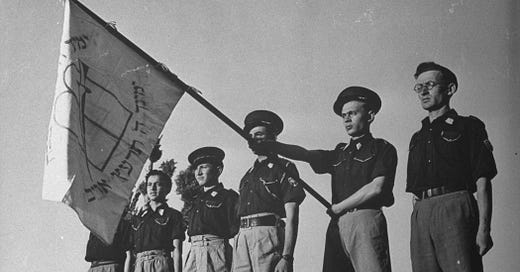



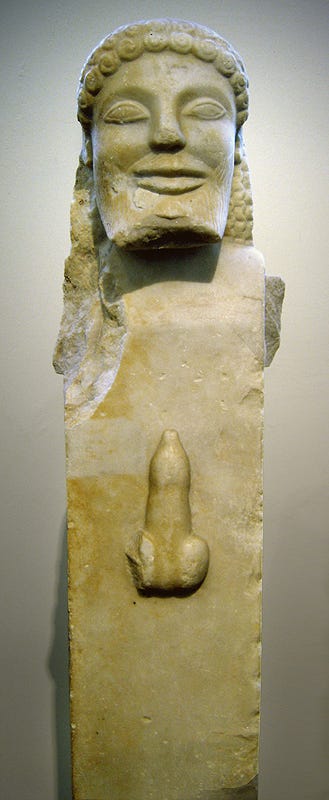
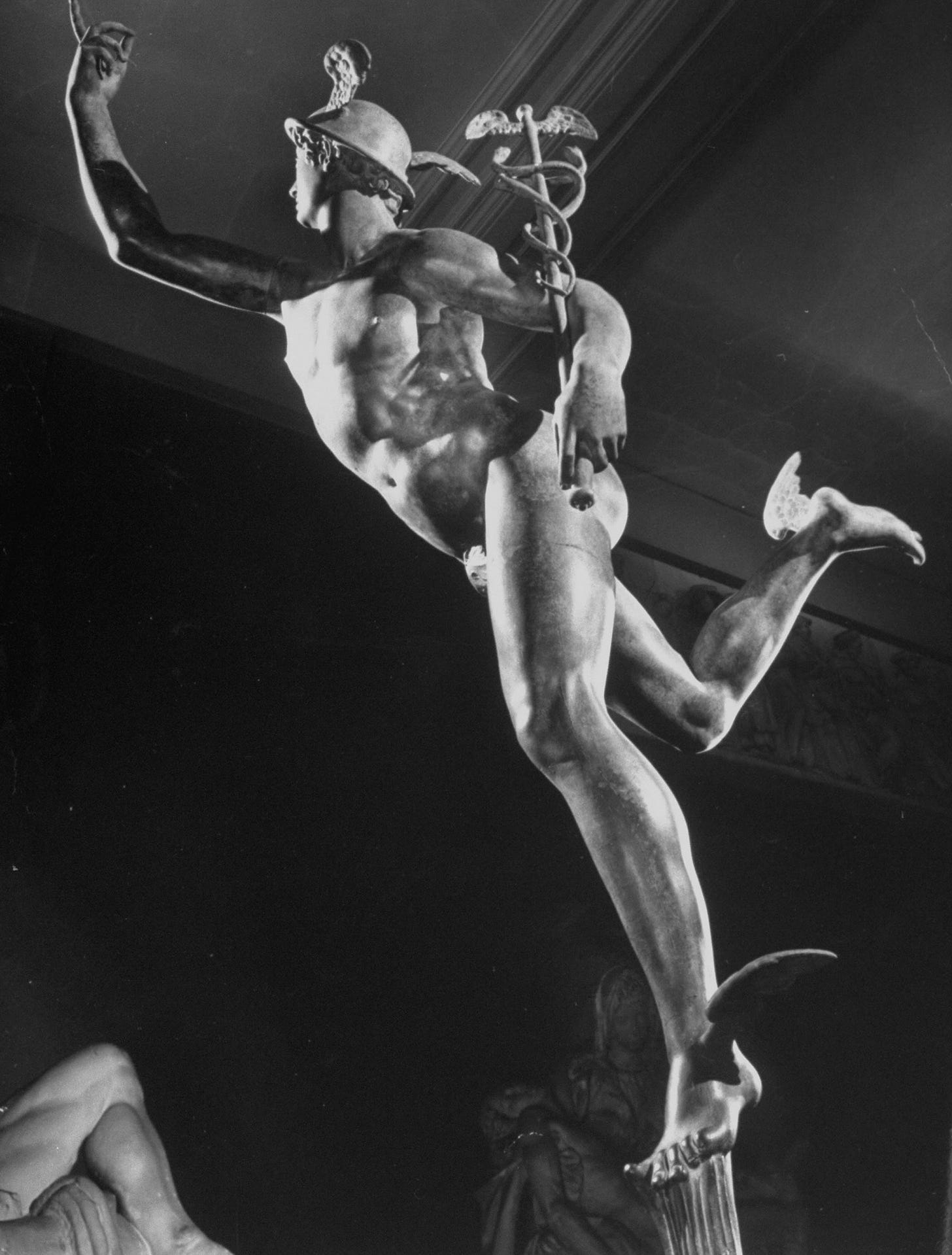



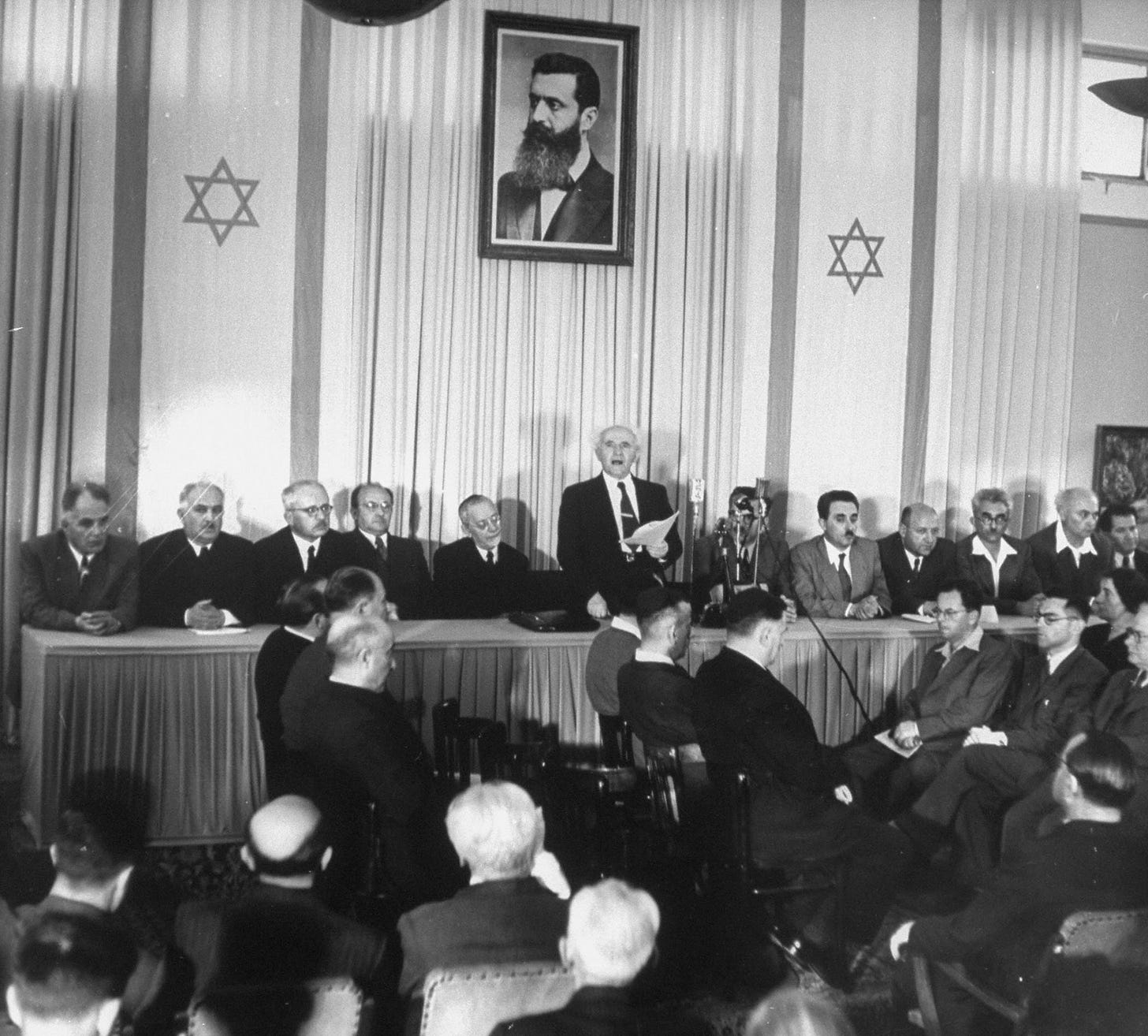
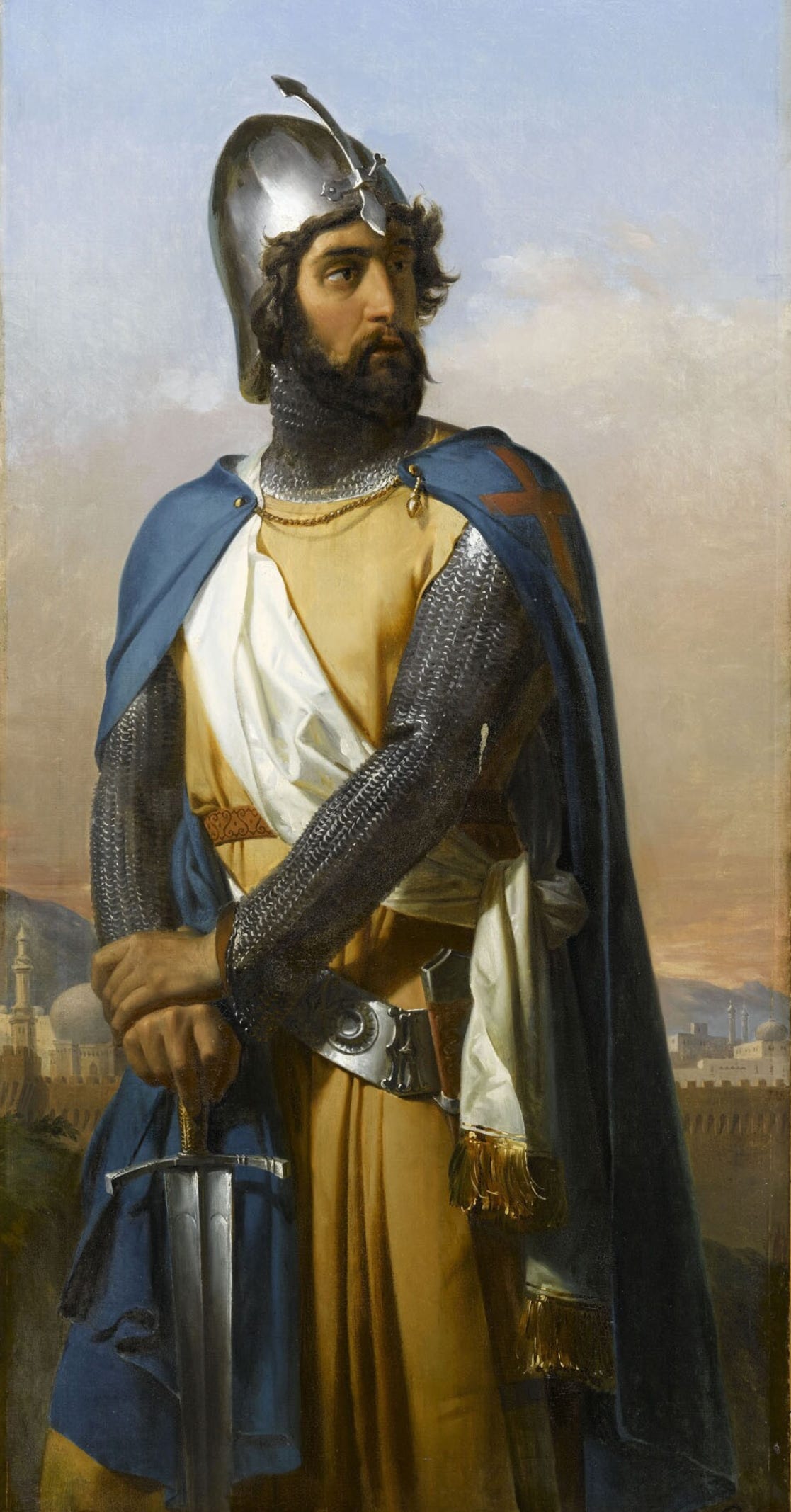
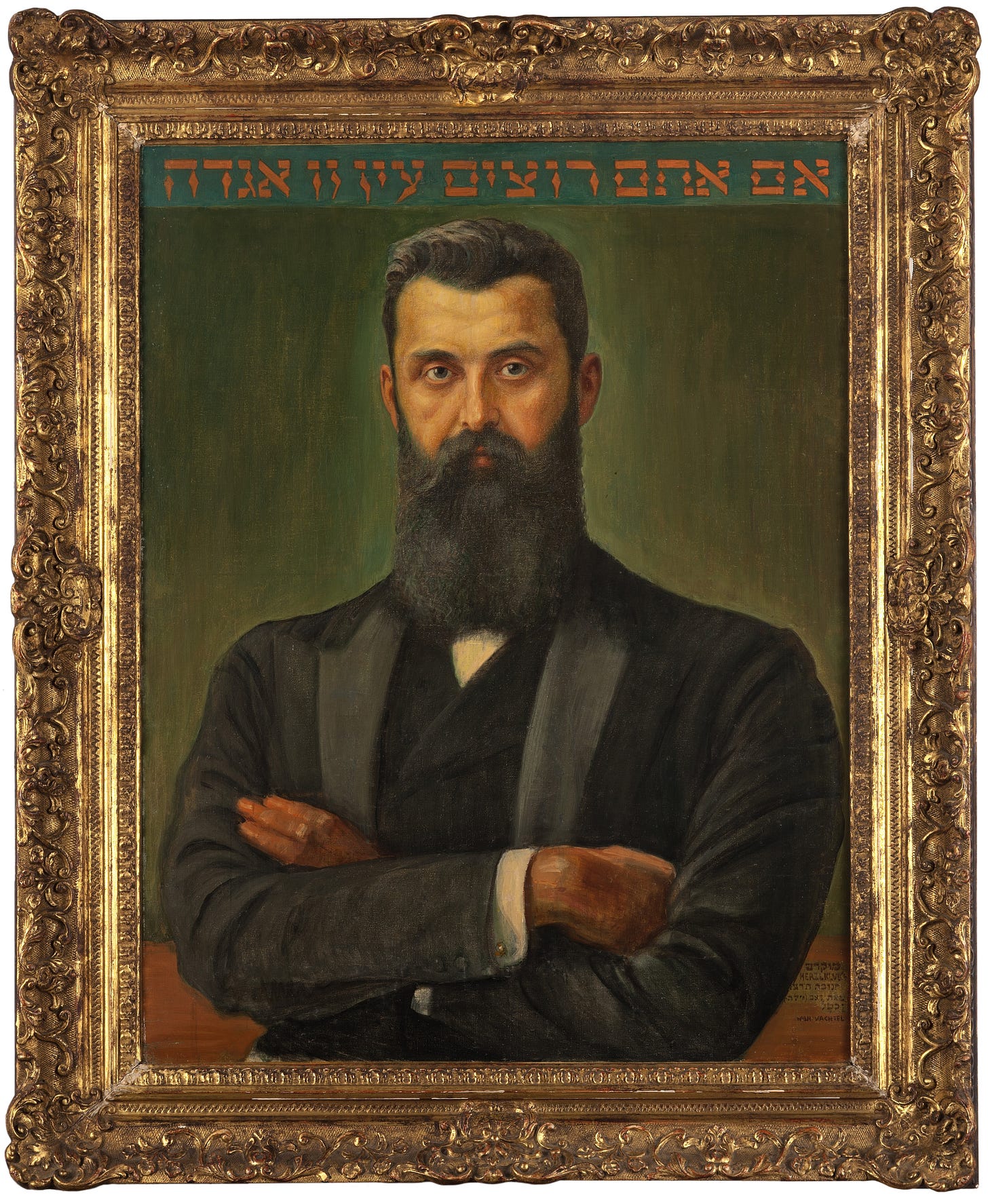
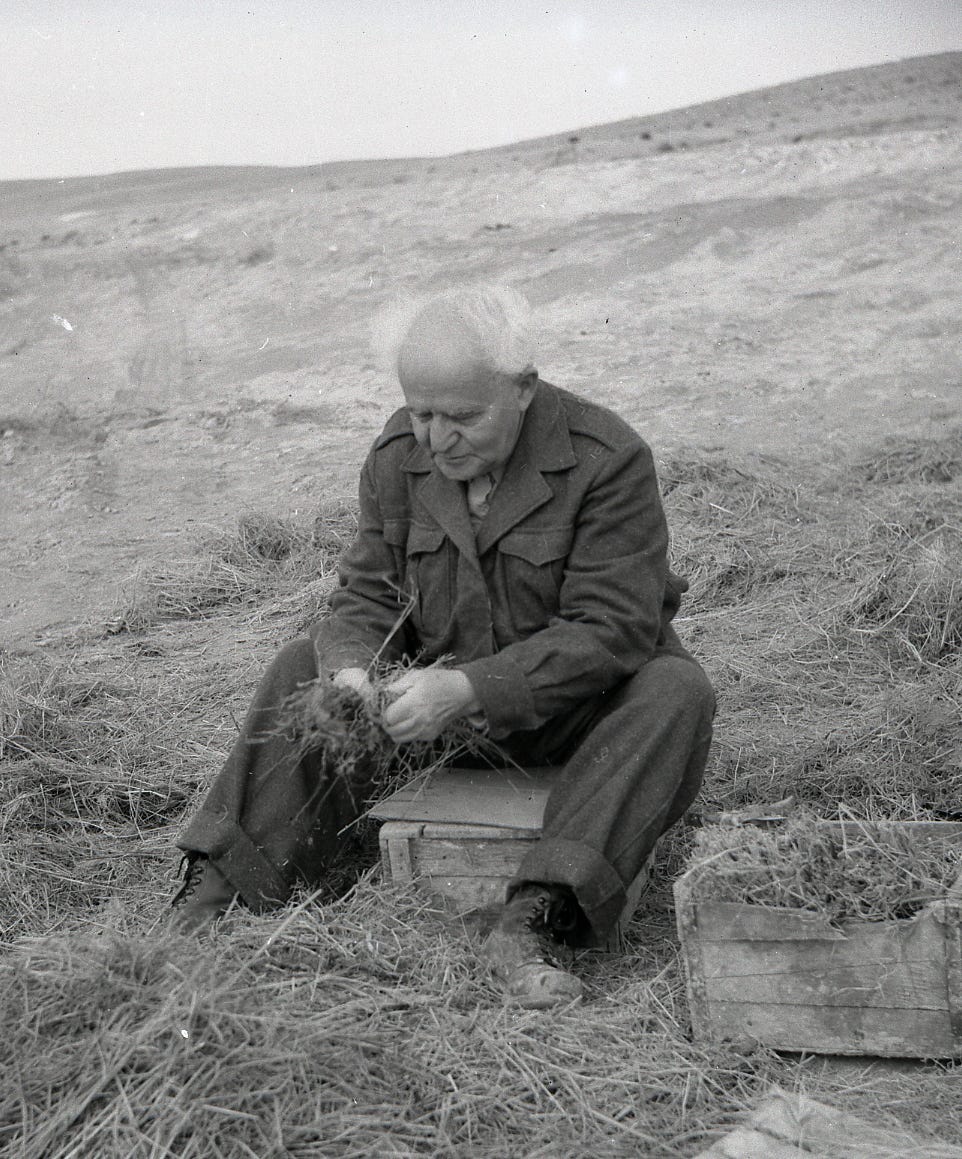

Very sharp writing here. Sometimes I also feel like we are in a "weird version of the Matrix", so to speak, when I see the Nth western news report about how the meany, muscly, manly "fascist" Zionists are doing again what they are best at to advance the interests of their nation with all the zeal and violence that it takes. It's exactly as you say, a weird inversion of the roles.
The historical relationship of the leftists with Jews/Zionism is most eloquent. When the jews were a homeless, battered people who could do nothing but propagate the dissolution of millennia-old identities, borders and nations (they had to in order to justify their very existence), they were the "daddy's girl" of most international worker's associations. They were the quintessential "proletarian" for them, the personification of the ideal of an international classless humanity that "shared" (some'd say steal) all the fruits of international labor. But when the Jews turned tribal, manly and warrior-like... well, we can see the results indeed. Very interesting article all around!
A few comments:
1) The term 'connected to soil' is rather vague, and usually deliberately so. One can say that Israelis are connected to soil in the sense that they are willing to kill and. to a somewhat lesser extent, die for it in a way Jews historically have not been. But they are not connected to soil in the sense of being connected to it any ordinary sense. About 1% of Israel's economy is agriculture, and most of the physical work is done by guest workers from Thailand. The truth is, as you say, because of technological change, being attached to the soil in the way that human beings were for most of their history is not really feasible. The only way it cold be done is either massive technological regression, or massive technological advance that allows us to outsource post-industrial civilization to machines so we can engage in agriculture as a form of recreation. Either case would entail the extinction of something like 9/10 of the human species. I think, on the whole, if you want to be connected to the soil, you should get an allotment.
2) The mercurialness of East European Jewry circa 1900 is rather exaggerated. They had been through 200 years of massive population growth combined with downward economic mobility. The rise of general literacy had taken away many of their traditional niches, even as they became too numerous to be employed in them. For this reason, and not any higher spiritual ideals, it made sense to get them somewhere else. It just turns out that America did that job perfectly well.
3) I agree that the uniqueness of historical 'antisemitism' is typically over-stated. Indeed, I have gone further than this and argued that the term should be retired entirely for anything before about 1830 (https://nonzionism.com/p/what-is-antisemitism). However, I think antisemitism as it developed and snowballed from the 1880s is quite distinct from anti-mercurialism in general, much in the same sense that Marxism-Leninism is distinct from generic 'kill rich people and take their stuff' politics.